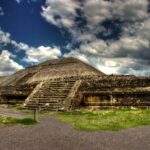The Netherlands' four seasons—spring, summer, autumn, and winter—highlight nature’s eternal cycles of change and renewal. Cultures like the Aztecs viewed life as continuous movement, symbolized by volcanoes and cycles of growth. Humanity’s beliefs about life, death, and faith evolve over time, reflecting nature's timeless rhythm of coming and going.

Exploring the Beauty of Nature and the Four Seasons in the Netherlands
Today I was able to discover once again how beautiful nature in the Netherlands is, and especially the four seasons. The four seasons in the Netherlands, Spring, summer, autumn and winter. We are now in autumn, the season in which the days are getting shorter, the leaves on the trees are changing colour and falling off. The temperature slowly drops towards zero. And we humans slowly have to get used to the winter temperatures, which can drop to -20 degrees Celsius.
Autumn in the Netherlands: A Time of Transition and Colourful Leaves
How wonderful it is to trudge through those fallen autumn leaves with my shoes. All that rustling that penetrates my ears so wonderfully. And now we are waiting for winter, the coldest time of the year. Winter with its cold and turbulent weather. Rain, snow, sleet and/or hail, the season in which the weather often causes many accidents in traffic, because many road users are not paying attention, and it gets dark faster. Drivers of vehicles are often mistaken about the condition of the road surface. But fortunately, after the winter it always comes back to spring, the period when the weather becomes milder again, and the days are longer again, because the sun starts to shine more again. After spring, a new summer appears automatically, and so nature has been taking its own course for centuries. I have never heard nature or the earth complain that another summer and or autumn was coming, nature always takes pleasure in what comes and goes. Hot summers and cold winters follow each other again and again.
Winter’s Challenge and Rhythm: Snow, Rain, and Seasonal Changes
But why do we humans complain again and again when a change occurs in the "seasons" of our lives? A well-known saying is: "things come, and things go", or: "life gives and life takes." Surely, we humans should have learned over the centuries that in the most common cases "after rain comes sunshine again?"
Philosophy of Change: The Aztecs’ Perspective on Life and Renewal
Life is an eternal movement. According to historian Francisco Mendoza, the Aztecs already said this when he stood at the foot of the Volcano in Teotihuacan in Mexico during an interview for a television documentary. These Aztecs worshipped the volcanoes whose ashes covered the earth over the centuries, and along which the water had flowed for centuries. They saw this as eternal life that never stops.These Aztecs said, "If a tree drops its fruit, it does not mean that this tree dies. It means that a new cycle begins. It is the beginning of something new, for the Catholic Church death is a punishment. According to this church, man was predestined to eternity, but because of the original sin of Adam and Eve (The bite of the apple from the tree in paradise), death became a punishment for man. According to the historian Francisco Mendoza, however, in the old Mexican tradition this was not a punishment, but a resourcing. One cycle ended, and a new one began. To this day, Mexican Christians continue to hold on to part of this tradition, even though churches are deliberately built on these volcanoes today. The belief in nature is preserved. In this way, a mixed religion has emerged in the countries of South America, in which old gods and rituals go hand in hand with the Christian tradition.
Faith, Afterlife, and the Continuity of Existence
As you all know by now, I am a great fan of the ideas of the psychologist Carl Gustav Jung, and many of his contemporaries. Many of them lived in the seventeenth and eighteenth centuries after Christ; all of them have expressed their opinion about what we call faith. Jung has indicated in several of his works that faith has undergone a development over the centuries (millennia). Many of his contemporaries, as well as his predecessors, emphasized this opinion. In their view, the belief originated from superstition, it was often about ghosts and spirits. According to them, much comes from older cultures such as those of the Aztecs, the Incas and the ancient Greeks. They gave all these "critters" a name. In a later era, there lived in about 700 BC a prophet named Zarathustra (Zoroaster, from Zoroastrian), according to many historical books and Jung this prophet was the beginning of worshipping a single god, although this prophet did divide the one God between good and evil, man had to choose for himself.
The Eternal Cycle of Change: From Origins to Future Seasons
Changes come, and changes do, and life will "always" exist. In what form, and where? I once read that man owes his origin to a small salamander-like animal that has withstood many storms and hurricanes. It was not until much later that apes, such as Neanderthals, emerged. Isn't it wonderful to look back on our origins and then think about how beautiful it can all be and quietly think that all setbacks have been good for something at some point, on to our new coming seasons, Things come things go.










